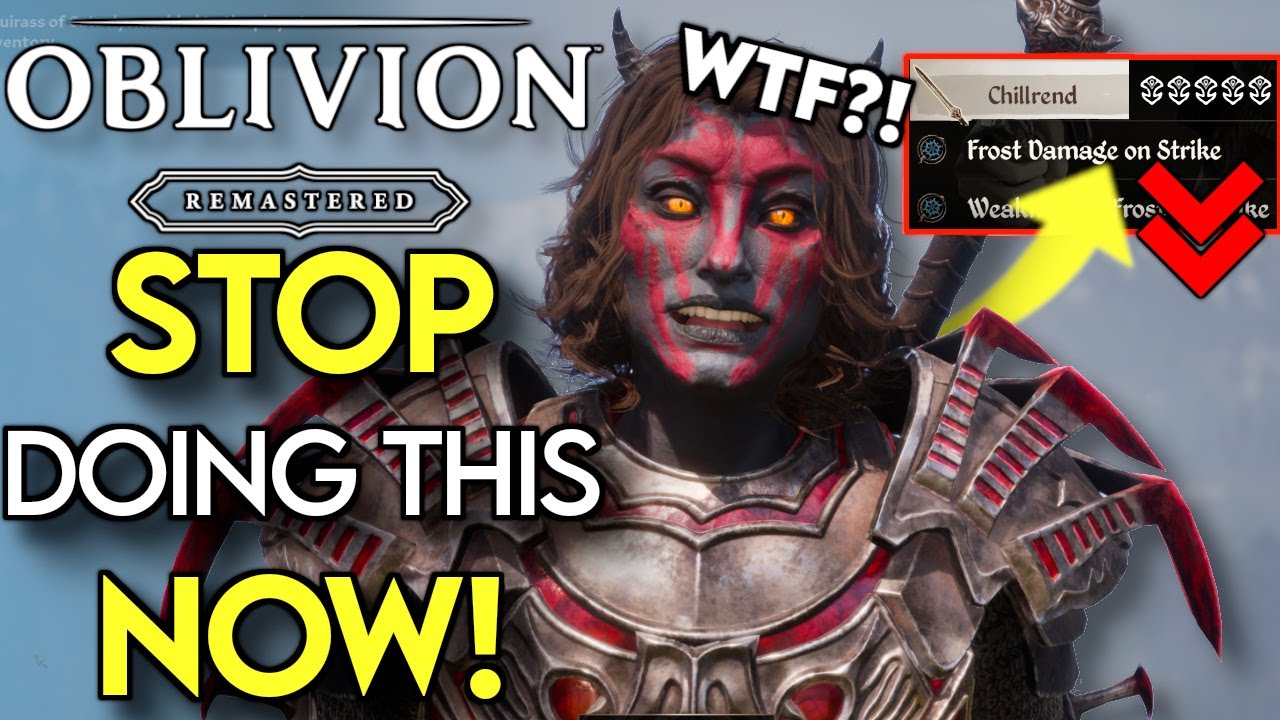The Elder Scrolls IV: Oblivion Remastered breathes new life into the 2006 classic, delivering enhanced visuals, refined mechanics, and quality-of-life improvements while preserving the sprawling world of Cyrodiil. Whether you’re a returning hero or a new adventurer, this open-world RPG’s depth can be as daunting as it is enchanting, with complex systems like leveling, alchemy, and faction quests that invite costly errors. From mismanaging your character build to ignoring key gameplay mechanics, these mistakes can derail your journey through Tamriel. Drawing from community insights and gameplay analysis, this guide outlines 10 major mistakes to avoid in Oblivion Remastered to ensure you master the game’s challenges and enjoy its rich narrative.

1. Ignoring Efficient Leveling
Oblivion’s leveling system is unique but punishing if mismanaged. Your character levels up by increasing major skills, but enemies scale with your level, making inefficient builds a death sentence. A common mistake is choosing major skills you use frequently (e.g., Blade for a warrior) without planning attribute gains. For example, leveling Blade increases your Strength but neglects Endurance or Intelligence, leaving you underpowered. Instead, select major skills you can control (e.g., Restoration, Alchemy) and train minor skills to maximize attribute bonuses (+5 per attribute) at each level. Use the in-game journal to track skill progress and sleep strategically to level up with optimal stats.
2. Neglecting Endurance Early
Endurance governs health growth, and Oblivion Remastered retains the original’s unforgiving health scaling: your health increases by 10% of your Endurance per level. Many players prioritize Strength or Agility early, only to find their health pool lacking against Daedric enemies at higher levels. Starting with low Endurance (e.g., 30) means you’ll have significantly less health than if you’d boosted it to 50 early. Choose a race with high Endurance (e.g., Orc, Nord) or focus on Endurance-based skills like Heavy Armor or Block in the first 10 levels. Aim for 60+ Endurance by level 10 to ensure durability.
3. Overlooking Alchemy’s Power
Alchemy is one of Oblivion’s most potent systems, yet many players ignore it, assuming it’s too complex or grindy. This mistake leaves gold, healing, and buff potions on the table, especially in Remastered’s tougher encounters. Basic ingredients like Wheat Grain and Lavender (found in farms and fields) create Restore Health potions, while rare ones like Daedra Hearts yield powerful buffs. Failing to gather ingredients during exploration or invest in a mortar and pestle early limits your survivability. Start collecting ingredients from barrels and plants, craft potions at alchemy stations, and sell excess for gold. By level 15, aim for Journeyman Alchemy to craft multi-effect potions.
4. Rushing the Main Quest
The Oblivion Gates and main quest are thrilling, but diving into them immediately is a trap. Remastered enhances the main story’s visuals and difficulty, but early gates are brutal for low-level characters (under level 10). Rushing also locks you out of side quests and faction storylines, like the Dark Brotherhood or Mages Guild, which offer unique rewards (e.g., Shadowmere, Spellmaking). Completing the main quest early scales enemies to high levels, making side content harder. Instead, explore Cyrodiil, join factions, and level up to 15-20 before tackling Kvatch. This ensures you’re equipped with skills, gear, and experience for the Daedric invasions.
5. Mismanaging Faction Quests
Factions like the Fighters Guild or Thieves Guild offer rich storylines and rewards, but players often join multiple factions without planning, leading to conflicting quests or missed opportunities. For example, starting the Thieves Guild before the Mages Guild can lock you out of certain dialogue options due to reputation changes. Remastered adds new faction-specific gear, making completion even more rewarding, but mismanaging quest order can delay or block rewards. Research faction questlines (use the in-game journal or community wikis) and prioritize one at a time. Complete the Mages Guild for spellmaking before the Thieves Guild for stealth gear, and save the Dark Brotherhood for its high-damage rewards.
6. Ignoring Enchanting and Spellmaking
Remastered enhances enchanting and spellmaking with streamlined interfaces, yet many players skip these systems, relying on looted gear or basic spells. This leaves you underpowered against high-level enemies like Xivilai. Enchanting weapons with Fire Damage or armor with Fortify Health at Arcane University (Mages Guild) massively boosts combat prowess. Spellmaking lets you craft custom spells, like a 100-point Fire Damage spell for low magicka cost. Failing to join the Mages Guild or collect soul gems early limits these options. Start capturing souls with Azura’s Star (reusable soul gem from the Daedric quest) and reach Journeyman Armorer/Alteration for enchanting by level 15.
7. Poor Inventory Management
Oblivion’s encumbrance system punishes hoarding, yet players often carry useless items (e.g., 50 iron daggers) or neglect Feather potions, reducing mobility and combat efficiency. Remastered’s updated inventory UI helps, but overencumbrance still slows you down, making you vulnerable to fast enemies like Will-o-the-Wisps. Regularly sell low-value items at merchants, store heavy gear (e.g., spare armor) in your house (buy one in Cheydinhal for 10,000 gold), and craft Feather potions to increase carry weight. Keep your inventory below 75% capacity and prioritize high-value loot like Daedric artifacts for profit.
8. Underestimating Stealth Mechanics
Stealth is a powerful playstyle in Oblivion Remastered, with improved AI detection and sneak attack multipliers (up to 6x damage). Many players ignore stealth, assuming it’s too slow or hard, missing out on easy kills and Thieves Guild rewards. Sneak attacks with a bow or dagger can one-shot enemies like Goblins, and Remastered’s lighting tweaks make shadows more effective for hiding. Failing to train Sneak or invest in Agility leaves you stuck in clunky combat. Practice sneaking in low-stakes areas like the Imperial City sewers, equip light armor, and aim for Journeyman Sneak by level 10 for invisible crouching.
9. Neglecting Repair and Gear Maintenance
Weapons and armor degrade with use, reducing their effectiveness, yet players often forget to repair gear, especially in Remastered’s tougher dungeons. A broken sword deals half damage, and worn armor leaves you vulnerable to Ogres. Repair Hammers are cheap (10 gold), but many carry too few or rely on merchants, wasting gold. Failing to train Armorer also limits repair efficiency. Always carry 5-10 Repair Hammers, train Armorer to Journeyman by level 15 for field repairs, and enchant gear with Fortify Armorer for faster fixes. Check gear condition after every major fight to stay combat-ready.
10. Skipping Daedric Quests
Daedric quests offer some of Oblivion’s best rewards, like the Skeleton Key (unbreakable lockpick) or Sanguine Rose (summons Daedra), but players often skip them, assuming they’re too hard or obscure. Remastered enhances these quests with new visuals and balanced difficulty, making them more accessible. Ignoring shrines (e.g., Azura’s at level 2) means missing game-changing artifacts that ease exploration and combat. Start with Azura’s quest for the reusable soul gem, then tackle Nocturnal’s for the Skeleton Key by level 10. Use the in-game map to locate shrines and check level requirements to avoid underpowered attempts.
Tips to Avoid These Pitfalls
To master Oblivion Remastered and sidestep these mistakes:
Plan Your Build: Use a character planner to map major/minor skills and attribute gains for efficient leveling.
Explore Early: Visit cities, join factions, and gather ingredients before the main quest to build resources.
Diversify Skills: Train Alchemy, Sneak, and Armorer alongside combat skills for versatility.
Save Often: Oblivion’s autosave can fail in dungeons; manually save before fights or quests.
Use the Journal: Track quests and skill progress to avoid conflicts and optimize leveling.
Why Avoiding These Mistakes Matters
These mistakes can turn Cyrodiil’s adventure into a frustrating grind, especially in Remastered’s enhanced difficulty modes. Community discussions highlight how ignoring Endurance or rushing the main quest leaves players underpowered against level-scaled enemies like Minotaurs, while skipping Alchemy or Daedric quests limits resources and rewards. Conversely, players who optimize leveling, enchant gear, and explore factions report breezing through Oblivion Gates with 500+ health and custom spells. Avoiding these errors ensures you experience Oblivion Remastered’s full potential, from its epic story to its boundless exploration.
Conclusion
The Elder Scrolls IV: Oblivion Remastered is a masterpiece that rewards strategic planning and punishes oversight. By avoiding these 10 major mistakes—ignoring efficient leveling, neglecting Endurance, overlooking Alchemy, rushing the main quest, mismanaging factions, skipping enchanting/spellmaking, poor inventory management, underestimating stealth, neglecting repairs, and missing Daedric quests—you’ll transform your journey into a triumphant saga. Whether you’re battling Dremora or uncovering Ayleid ruins, these tips will help you conquer Tamriel with confidence. Dive into Cyrodiil, refine your strategy, and forge your legend in the heart of the Empire.





